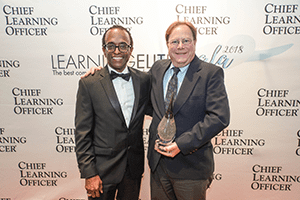Thanks to a robust learning strategy, HPI is prepared to manage the uncharted territories of health care in the U.S.
by Andie Burjek
May 24, 2018

With the American health care environment in flux, for an insurance company to not only maintain but improve excellence over the past several years is truly an admirable feat. The Health Plan Institute, the learning and development arm that supports the sales, marketing and business development staff of major health insurer Kaiser Permanente, managed to do just that, rising through the LearningElite ranks even as the future of U.S. health care grows increasingly uncertain.
HPI took the No. 43 spot in the 2015 LearningElite competition. It’s only improved since, taking No. 26 in 2016, No. 21 in 2017 and now No. 8.
HPI has been able to rise in the ranks for several reasons, according to David Livingston, executive director of sales, account management training and performance support at Kaiser Permanente. HPI has the support of an engaged executive leadership team, which rewards and recognizes the importance of the sales department’s expertise. It also keeps a departmental business strategy consistent with the overall corporate strategy. Finally, though HPI’s 30 employees originally supported Kaiser Permanente’s sales account management population of about 2,000 people, its learning has extended beyond to the overall organization.
The learning strategy starts with an important gathering of key people.
“We have a very rigorous process for analyzing learning needs and priorities each year,” Livingston said. HPI meets with business leaders and key stakeholders to understand what the enterprise’s needs are. “By doing so, we come to the table with a greater understanding of what the business needs are, and we translate that into how we as a learning organization could impact those business needs,” he said.
Also valuable is the Learning Strategy and Business Impact survey that HPI distributes to all its stakeholders, which allows them to provide their input on HPI’s communication/delivery methods, solutions and outcomes. Finally, on an individual level, HPI uses a tool called the Self-Directed Learning Engine to assess employees on where they are and where they need to be. It helps HPI create individualized growth plans.
One major challenge in the health care space for the sales arm is how dynamic the industry is. HPI must keep track of what takes place on the national level as well as what takes place regionally based off state requirements, Livingston said. When it comes to the sales staff, “One of the attributes we look for is learning curiosity, because you can’t be stagnant in this business. Your success depends on your knowledge base and things are always changing. What we have to do is make sure they have access to information in a timely manner,” he added.
By the time the organization publishes information about health care it’s often outdated, thanks to the dynamic nature of health care, Livingston said. To solve for this and make sure its employees were learning the right information at the right time, HPI offered them a series of opportunities. It had doctors on call once a week, and sales managers could call in and get their questions answered immediately as part of the learning track. They also had access to live webinar sessions of health care updates.
“We focused on the managers because they have the greatest impact on the people they work with and they could be the rally champion for that education,” Livingston said.
Kaiser Permanente’s response to the Affordable Care Act has seen impressive results. In the 70 years the company has been around, it has gained 20 percent of its current membership since 2014, “demonstrating our readiness to go to market effectively in the complex ACA environment,” according to HPI’s award application.
Another significant program HPI has improved is its coaching program. People always coached, but they didn’t have a structured framework to coach consistently or effectively, and they did not have a way to receive feedback on what they were doing well and what they could improve on, Livingston said. So HPI adopted a model called PAUSE developed by the Corporate Executive Board.
Formalizing this coaching process has allowed HPI to develop a solid coaching culture that the Corporate Executive Board’s Coaching Effectiveness Survey has deemed “best in class” for the past two years, putting Kaiser Permanente’s managers in the top 25 percent of organizations.
Livingston is especially proud of a new program that has expanded the reach of the sales arm’s learning content. When HPI did an analysis of its learning content, it found that Kaiser Permanente employees in the organization outside of sales account management underwriting were actually taking HPI’s online onboarding program.
“Although it was very sales focused, there was still enough content that met their needs,” Livingston said. HPI revamped the onboarding program and built a new platform. It made time for social interactions in between learning sessions so people could discuss what they learned, and it began to include guest speakers from throughout the enterprise.
“This program has become so robust and so well-known is such a short time,” Livingston said. “We’ve gone from the initial 100 folks that went through last year to 600 this year. And we’re excited about what we’re doing in terms of making an imprint.”
Looking forward, the organization plans on continuing to focus on tools and processes that help employees do their best job, Livingston said. It’s invested in many new technologies like career development platforms, online coaching tools and personalized learning, and it’s looking into virtual reality and augmented reality to see how it could potentially be useful to its workforce.
Read more about the 2018 LearningElite winners.
Andie Burjek is a Chief Learning Officer associate editor. To comment, email editor@CLOmedia.com.




